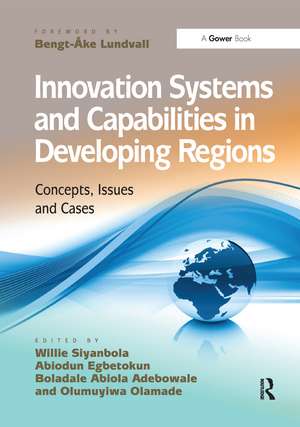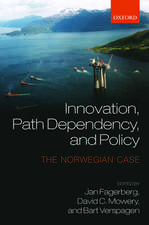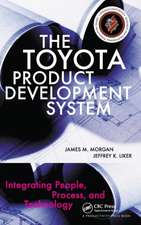Innovation Systems and Capabilities in Developing Regions: Concepts, Issues and Cases
Autor Willie Siyanbola Editat de Abiodun Egbetokun Autor Olumuyiwa Olamadeen Limba Engleză Paperback – 22 mai 2017
| Toate formatele și edițiile | Preț | Express |
|---|---|---|
| Paperback (1) | 299.52 lei 6-8 săpt. | |
| Taylor & Francis – 22 mai 2017 | 299.52 lei 6-8 săpt. | |
| Hardback (1) | 828.87 lei 6-8 săpt. | |
| Taylor & Francis – 14 sep 2012 | 828.87 lei 6-8 săpt. |
Preț: 299.52 lei
Preț vechi: 341.55 lei
-12% Nou
Puncte Express: 449
Preț estimativ în valută:
57.32€ • 59.45$ • 47.79£
57.32€ • 59.45$ • 47.79£
Carte tipărită la comandă
Livrare economică 27 martie-10 aprilie
Preluare comenzi: 021 569.72.76
Specificații
ISBN-13: 9781138115729
ISBN-10: 113811572X
Pagini: 384
Dimensiuni: 174 x 246 mm
Greutate: 0.45 kg
Ediția:1
Editura: Taylor & Francis
Colecția Routledge
Locul publicării:Oxford, United Kingdom
ISBN-10: 113811572X
Pagini: 384
Dimensiuni: 174 x 246 mm
Greutate: 0.45 kg
Ediția:1
Editura: Taylor & Francis
Colecția Routledge
Locul publicării:Oxford, United Kingdom
Notă biografică
Willie Siyanbola is the Director-General/CEO of Nigeria's National Centre for Technology Management (NACETEM). He holds a PhD in solid state physics from the University of Sussex and received executive training at the Harvard Kennedy School of Government. He is widely travelled and published. Abiodun Egbetokun is a Senior Research Officer in Technology, Innovation and Enterprise Studies at NACETEM and a doctoral student of innovation economics at the Friedrich-Schiller University, Jena, Germany. Boladale Adebowale is a Principal Research Officer NACETEM. Her PhD in technology and innovation management is from the University of Malaya. She has consulted for the World Bank, UNIDO etc on innovation and technological capabilities in sub-Saharan Africa. Olumuyiwa Olamade is a Chief Research Officer and the Director of a zonal office at NACETEM. He holds a PhD in technology management and has published several articles on the subjects of innovation and technological capabilities.
Recenzii
'Developing countries need a much deeper understanding of the process through which technology flows towards them, the way it is acquired and mastered, and its impacts in their domestic economies. They also need to rethink, redesign and upgrade their key science, technology and innovation institutions with a view to improve their effectiveness and efficiency, incorporating best practices from both developed and developing countries. This book goes a long way in this direction, and is edited by some of the most promising scholars from Nigeria. The book is highly recommended.' Jorge Niosi, University of Québec at Montreal, Canada 'Science, technology and engineering education and development are critical to transforming latecomer economies, often from primary commodity producing into knowledge based economies. For instance, the primary, mineral and agricultural based economy has proved to be a burden rather than a help to Africa. It is estimated that something like 268 billion dollars flows out of Africa, and hardly less than 30 billion comes to Africa. The economic structure that allows this gross outflow and inflow dynamics must be changed. It can be changed when works for capacity and competence building like this volume come out. I recommend highly this work that centres science, technology, engineering and innovation for economic development and transformation.' Mammo Muchie, SARChI Research Professor, IERI,Tshawne University of Technology, Pretoria, RSA
Cuprins
1: Innovation Systems and Capabilities in Developing Regions; Part I: Conceptual and Theoretical Contributions; 2: Systems of Innovation and Capability; 3: The Contributions of Quality Infrastructure to National Innovation Systems; Part II: Innovation Systems Case Studies; 4: Indian Innovation System; 5: Formation of Emerging Technological Innovation Systems in Iran; 6: Knowledge Transfer and the Biopharmaceutical Innovation System in Taiwan; 7: Urban Water Innovation Systems in Newly Industrialized Countries; Part III: Innovation, Technological Learning and Capabilities; 8: The Complexity of Innovation Capabilities Development; 9: How Firms Develop Technological Capabilities Through Acquisition of Foreign Technology; 10: Technological Discontinuity and Industrial Catch-up; Part IV: Learning and Interactions Within Systems; 11: Patent and Innovation; 12: Determinants of Public Research Organizations–Industry Interactions in Latecomer Pharmaceutical Research and Development; 13: Innovation and Social Capital in Small and Medium-sized Enterprises; 14: Networking Capabilities and Innovation in a Traditional Small-scale Agro-industry; 15: Learning Innovation and Technological Performance in the Nigerian and Malaysian Oil Palm Sector; 16: Conclusions and Implications for Policy and Practice
Descriere
Much of what we know about innovation theory and systems has come from the developed countries and reflects their world view. Innovation Systems and Capabilities in Developing Regions adds to the growing body of knowledge about innovation and innovation systems in developing countries. The case studies presented here advance the notion that, while developing countries may not engage in frontier research, a critical knowledge base from which these countries compete in global markets is emerging. State and non-state actors are increasingly emphasising policies that sit within the framework of national innovation systems. This book illuminates this shift in policy competence at national levels. It also provides empirical evidence on the drivers, dynamics and impact of diffusion-based innovation linked to technology transfer and acquisition in developing economies, and the constraints that apply.


















